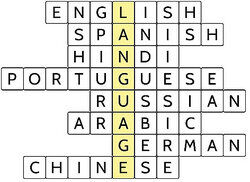Esperanto Definition
- romanal
- ro
- novial
- nov-esperanto
- interlingua
- europan
Origin of Esperanto
-
From Esperanto esperanto (“one who hopes”), from French espérer, from Latin sperare (“to hope”). Originally, this was the pseudonym assumed by the language's creator, L. L. Zamenhof, and the language was called Lingvo Internacia (“international language”).
From Wiktionary
After Dr. Esperanto , “one who hopes,” pseudonym of Ludwik Lejzer Zamenhof (1859–1917), Polish philologist
From American Heritage Dictionary of the English Language, 5th Edition
Find Similar Words
Find similar words to Esperanto using the buttons below.


